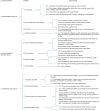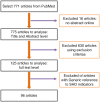Scoping review: national monitoring frameworks for social determinants of health and health equity
- PMID: 26853896
- PMCID: PMC4744868
- DOI: 10.3402/gha.v9.28831
Scoping review: national monitoring frameworks for social determinants of health and health equity
Abstract
Background: The strategic importance of monitoring social determinants of health (SDH) and health equity and inequity has been a central focus in global discussions around the 2011 Rio Political Declaration on SDH and the Millennium Development Goals. This study is part of the World Health Organization (WHO) equity-oriented analysis of linkages between health and other sectors (EQuAL) project, which aims to define a framework for monitoring SDH and health equity.
Objectives: This review provides a global summary and analysis of the domains and indicators that have been used in recent studies covering the SDH. These studies are considered here within the context of indicators proposed by the WHO EQuAL project. The objectives are as follows: to describe the range of international and national studies and the types of indicators most frequently used; report how they are used in causal explanation of the SDH; and identify key priorities and challenges reported in current research for national monitoring of the SDH.
Design: We conducted a scoping review of published SDH studies in the PubMed(®) database to obtain evidence of socio-economic indicators. We evaluated, selected, and extracted data from national scale studies published from 2004 to 2014. The research included papers published in English, Italian, French, Portuguese, and Spanish.
Results: The final sample consisted of 96 articles. SDH monitoring is well reported in the scientific literature independent of the economic level of the country and magnitude of deprivation in population groups. The research methods were mostly quantitative and many papers used multilevel and multivariable statistical analyses and indexes to measure health inequalities and SDH. In addition to the usual economic indicators, a high number of socio-economic indicators were used. The indicators covered a broad range of social dimensions, which were given consideration within and across different social groups. Many indicators included in the WHO EQuAL framework were not common in the studies in this review due to their intersectoral and interdisciplinary nature.
Conclusions: Our review illustrates that the attention to SDH monitoring has grown in terms of its importance and complexity within the scientific health literature. We identified a need to make indicators more wide-ranging in order to include a broader range of social conditions. The WHO EQuAL framework can provide intersectoral and interdisciplinary means of building a more comprehensive standardised approach to monitoring the SDH and improving equity in health.
Keywords: EQuAL; equity; framework; health inequity; indicators; inequality; monitoring; scoping review; social determinants.
Figures






Similar articles
-
Towards a global monitoring system for implementing the Rio Political Declaration on Social Determinants of Health: developing a core set of indicators for government action on the social determinants of health to improve health equity.Int J Equity Health. 2018 Sep 5;17(1):136. doi: 10.1186/s12939-018-0836-7. Int J Equity Health. 2018. PMID: 30185200 Free PMC article.
-
The feasibility of measuring and monitoring social determinants of health and the relevance for policy and programme - a qualitative assessment of four countries.Glob Health Action. 2016 Feb 5;9:29002. doi: 10.3402/gha.v9.29002. eCollection 2016. Glob Health Action. 2016. PMID: 26853897 Free PMC article.
-
Public social monitoring reports and their effect on a policy programme aimed at addressing the social determinants of health to improve health equity in New Zealand.Soc Sci Med. 2014 Jan;101:61-9. doi: 10.1016/j.socscimed.2013.10.043. Epub 2013 Nov 15. Soc Sci Med. 2014. PMID: 24560225
-
Mapping experiences and perspectives of equity in international health collaborations: a scoping review.Int J Equity Health. 2021 Jan 9;20(1):28. doi: 10.1186/s12939-020-01350-w. Int J Equity Health. 2021. PMID: 33422065 Free PMC article.
-
Addressing Health Equity Through Action on the Social Determinants of Health: A Global Review of Policy Outcome Evaluation Methods.Int J Health Policy Manag. 2018 Jul 1;7(7):581-592. doi: 10.15171/ijhpm.2018.04. Int J Health Policy Manag. 2018. PMID: 29996578 Free PMC article. Review.
Cited by
-
Connections and Biases in Health Equity and Culture Research: A Semantic Network Analysis.Front Public Health. 2022 Mar 29;10:834172. doi: 10.3389/fpubh.2022.834172. eCollection 2022. Front Public Health. 2022. PMID: 35425756 Free PMC article.
-
Investigating inconsistencies regarding health equity in select World Health Organization texts: a critical discourse analysis of health promotion, social determinants of health, and urban health texts, 2008-2016.BMC Glob Public Health. 2024 Dec 4;2(1):81. doi: 10.1186/s44263-024-00106-w. BMC Glob Public Health. 2024. PMID: 39681940 Free PMC article.
-
Identifying health policy and systems research priorities on multisectoral collaboration for health in low-income and middle-income countries.BMJ Glob Health. 2018 Oct 10;3(Suppl 4):e000970. doi: 10.1136/bmjgh-2018-000970. eCollection 2018. BMJ Glob Health. 2018. PMID: 30364329 Free PMC article.
-
Health equity monitoring is essential in public health: lessons from Mozambique.Global Health. 2019 Dec 18;15(1):67. doi: 10.1186/s12992-019-0508-4. Global Health. 2019. PMID: 31847863 Free PMC article.
-
Analyzing Spatial Patterns of Health Vulnerability to Drought in the Brazilian Semiarid Region.Int J Environ Res Public Health. 2021 Jun 9;18(12):6262. doi: 10.3390/ijerph18126262. Int J Environ Res Public Health. 2021. PMID: 34207877 Free PMC article.
References
-
- Marmot M. Social determinants of health inequalities. Lancet. 2005;365:1099–104. - PubMed
-
- Commission on Social Determinants of Health. Final Report of the Commission on Social Determinants of Health. Geneva: World Health Organization; 2008. Closing the gap in a generation: health equity through action on the social determinants of health.
-
- Solar O, Irwin A. Social determinants of health discussion paper 2 (policy and practice) Geneva: World Health Organization; 2010. A conceptual framework for action on the social determinants of health.
-
- WHO. Rio political declaration on social determinants of health. World Conference on Social Determinants of Health, Rio de Janeiro. 2011. Available from: http://www.who.int/sdhconference/declaration/Rio_political_declaration.p... [cited 21 October 2011]
-
- United Nations. The millennium development goals report, 2014. New York: United Nations; 2014.
Publication types
MeSH terms
LinkOut - more resources
Full Text Sources
Other Literature Sources
Molecular Biology Databases
